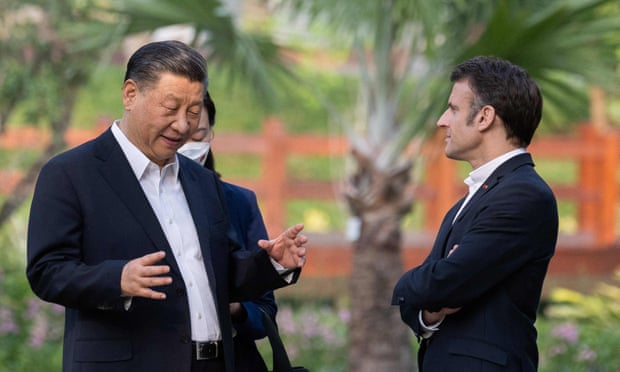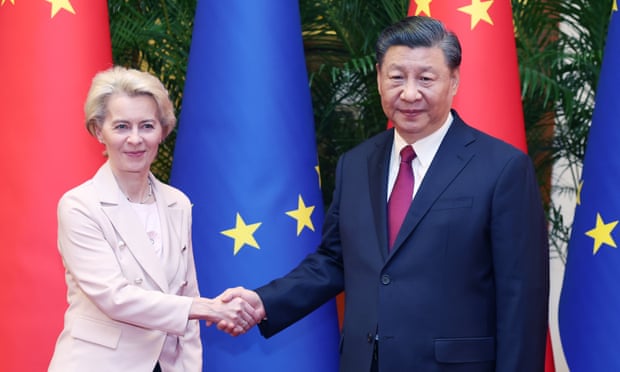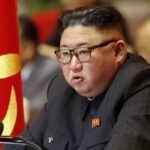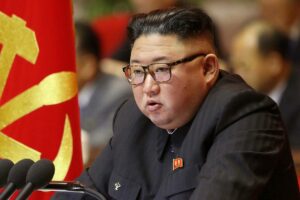China’s leader is gathering autocratic regimes to his banner, Europe and the US are divided over how to respond, and the French president just lobbed a grenade onto the field of international diplomacy
It is perhaps no surprise that Emmanuel Macron is in the middle of another big international row. France’s president likes to stir things up. It is his penchant, his trademark foible. Re-elected in 2022 despite a disappointing first term, he has four years left to make a difference. After that, political oblivion beckons – and Macron will still be under 50 in April 2027. Maybe this ticking clock helps explain why he courts danger like a bare-chested surfer riding the waves on the beach at Biarritz.
At home, Macron has caused uproar in recent months by pushing through controversial pension reforms opposed by two-thirds of the population. The row has contributed to a plunging personal approval rating, down to 30% this month. Facing a confidence vote in March, his government survived by bypassing parliament. The reforms are under legal challenge, while violent nationwide protests are continuing. Yet insouciant Macron seems almost oblivious at times.
Abroad, too, Macron has gained a reputation for tossing political hand-grenades – intentionally or by accident, who can say? In 2019, he famously declared that Nato was experiencing “brain death”. He could hardly have been more wrong. In 2021-22, he took it upon himself to mediate, ostensibly on Europe’s behalf, with Vladimir Putin over Ukraine. Even after Putin ignored him and invaded, Macron insisted Moscow should be offered “security guarantees” and that Russia not be “humiliated”.
The latest explosion was ignited by an interview Macron gave after a visit last weekend to Beijing, where he was showered with flattering attention by President Xi Jinping. On China policy, European countries were too subservient to the US and should not be Washington’s “followers”, he suggested. “Being an ally does not mean being a vassal… [or] mean we don’t have the right to think for ourselves.” Macron also implied that defending democratic Taiwan from a Ukraine-type Chinese invasion was not Europe’s business.

That was more than enough to put a lot of backs up. Yet two other aspects of his visit caused even greater alarm, and anger, among France’s friends and allies. One was that Macron again appeared to represent himself as speaking for all of Europe, which he definitely was not. This misleading impression was enhanced by his decision to take Ursula von der Leyen along for the ride. The EU commission president was reduced to playing second fiddle, sidelined by her hosts while he hogged the limelight. She must regret it now.
Objectionable to many, too, was Macron’s lauding of the idea of Europe as a separate geopolitical “pole”, or third superpower, on an equal footing with China and the US. His championing of this concept is nothing new. It is rooted in Gaullist thinking. Macron frequently promotes what he calls European “strategic autonomy”. The idea of keeping Americans, and Anglo-Saxons in general, at arm’s length has longstanding appeal in France, especially on the left. Hence his past criticism of Nato.
European autonomy is not such a terrible idea. Trouble is, Europe and the EU – the two are inter-changeable in this context – have consistently failed to live up to pipe dreams of global power. And so, too, has Macron’s France, in respect of offering substantive European leadership. Paris has been notably tight-fisted, for example, over providing military aid to Ukraine, compared with the US, the UK or even tiny, less wealthy countries such as Latvia.
Berlin thinks of itself, not Paris, as Europe’s natural leader. Busy-bee Macron’s pretensions and energy are resented there
China, on the other hand, just loves Macron’s ideas about rescuing Europe from America’s smothering embrace. His comments were wildly applauded in state-controlled media. Since taking power a decade ago, Xi has often been portrayed in the west as an inscrutable, unknown quantity. That’s really no longer the case. He makes no bones about his intention to create an authoritarian new world order orchestrated from Beijing. And that necessarily entails supplanting the US.
The launch of this new order is being undertaken in close collaboration with Putin – although, as Xi sees it, Russia will play a supporting role, essentially a tame provider of arms, energy and raw materials to China. Other, lesser autocracies such as Iran, Saudi Arabia, Syria and some African and Asian regimes are being lined up as founding members. Xi’s target: the current, US-led, UN-endorsed, democratic international rules-based system.
The main obstacles to the realisation of this alarming vision are political and military alliances linking the democracies of Europe, North America and the Indo-Pacific, notably Japan, South Korea and Australia. For Xi and Putin, the US is in inexorable political, economic and moral decline. They believe the corrosive Donald Trump Maga phenomenon is proof of this contention. But for now at least, the US remains the world’s single most influential nation and most capable military power.
So when a leading western player such as Macron, apparently intent on placating and appeasing China, suggests Taiwan is not worth fighting for, and gratuitously aggravates always-present US-Europe differences, Xi must surely rub his hands with glee. Little wonder he gave his French visitor a five-star welcome, chummy, ties-off down time and a slap-up dinner.
In Macron’s defence, political allies and analysts argue Europe and the US, enmeshed in vital trading, financial and climate relationships with China and highly dependent on the smooth running of global import-export supply chains (as shown during the pandemic), must maintain dialogue with Xi and the Chinese communist party, however objectionable their military, regional and human rights policies may be.
A second cold war is in no one’s interest, Macron’s supporters say. Given rising anti-China sentiment in Washington, and hyper-nationalism in China, any leader who can bridge the dangerously widening east-west gulf performs an essential service. More immediately, it’s pointed out that Europe, in particular, has a keen interest in undermining the developing Sino-Russian axis and persuading Xi to distance himself from Putin and his Ukraine catastrophe.
If that last objective is a true measure of Macron’s success, then he failed miserably in Beijing. He wanted China to reject any Russian request for weapons. He wanted it to condemn Putin’s nuclear weapons deployment in Belarus. And he wanted it to talk peace directly to Ukraine’s leader, Volodymyr Zelenskiy. Xi demurred on all fronts. Macron left empty-handed.
Europe’s failure to drive a wedge between China and Russia is hardly surprising. For Xi, the future is crystal clear: America is in decline
European leaders may be forgiven for saying, “I told you so.” A succession of senior politicians made the trip to Beijing in recent months, including Germany’s chancellor, Olaf Scholz, the EU council president, Charles Michel, and Pedro Sánchez, Spain’s prime minister. They, too, obtained no significant commitments on Ukraine, Russia, respect for the principle of territorial sovereignty or, for that matter, the trampled rights of Uyghurs, Tibetans and Hong Kongers. On the other hand, Xi made sure they felt welcome – unlike their American counterparts, who rarely get invited these days.
Europe’s failure to drive a wedge between China and Russia is hardly surprising. For Xi, the future is crystal clear: America is in decline, and within a quarter century China will take its rightful place as the most powerful nation on earth,” Ivo Daalder, former US ambassador to Nato, warned last week. “It can accelerate this future by aligning with Russia … and it can accelerate America’s decline by splitting away its European allies.
“Just last month, Xi assured Putin, ‘Right now, there are changes, the likes of which we have not seen for 100 years. And we are the ones driving these changes together,’” Daalder wrote. “China’s ambassador in Brussels calls China and the EU the ‘two major forces upholding world peace, two big markets promoting shared development, and two great civilisations promoting human progress’ … The goal is to lift Europe up [and] push the US down.”
While China is set on dividing Europe and the US, Macron’s hand-grenade diplomacy has divided Europe itself, exposing fundamental disagreements over how best to handle China. Germany appears especially aggrieved, a fact not unconnected to the sometimes tense relationship between the lugubrious Scholz and the French president. Berlin thinks of itself, not Paris, as Europe’s natural leader. Busy-bee Macron’s pretensions and energy are resented there.
Annalena Baerbock, Germany’s foreign minister, began her own, post-Macron China trip last week, reportedly intent on damage limitation. Visiting Tianjin, she said pointedly that “we cannot be indifferent” to Taiwan. “We are currently seeing how important it is to have partners around the world who share our values at our side when we face our own security threats.” Baerbock’s words were a not-so-subtle rebuke to Macron.
Meanwhile, criticism of Macron has predictably poured in from strongly pro-American, pro-Nato eastern and central European governments that have zero faith or interest in Macron-style geopolitical pole-dancing and, to them, the utterly fanciful idea of French leadership of a go-it-alone Europe.

The EU’s China debate is mirrored in Britain, where similar divisions exist. Yet Macron’s comments seem to have pushed Rishi Sunak to go further than before in characterising China as a “threat” to UK “economic security”. The prime minister said Britain shared US concerns about Taiwan and claimed, absurdly, that the UK was already a global pole itself – a “foreign policy superpower” that did not need to agree with France. Another split for Xi to exploit.
Sunak faces continuing pressure to adopt a tougher stance, including sanctions in addition to those already imposed on individuals and companies such as Huawei and TikTok. He and his predecessors, Boris Johnson and Liz Truss, have presided over a mini-tilt towards the Indo-Pacific, desperately hoping to boost post-Brexit trade but also in support of US efforts to counter Chinese expansionism in the South China Sea. This shift helped produce the 2021 Aukus submarine deal with the US and Australia that so infuriated Macron.
Attempting to restore a smidgeon of personal political credibility, Truss has set out a particularly hawkish line on China. She told the rightwing Heritage Foundation in Washington last week that Macron was guilty of “weakness” in seeking Xi’s help over Ukraine. “Instead our energies should go into taking more measures to support Taiwan. We need to make sure Taiwan is able to defend itself. We need to put economic pressure on China before it is too late,” Truss said.
This sort of hardline, take-no-prisoners approach goes down well in Washington these days. As Daalder noted, US politicians of all stripes, who cannot agree on anything else, are falling over each other to sound tough on China. In part this is a legacy of the Trump years, when bilateral relations deteriorated sharply. In part, it is a reaction to Xi’s perceived aggressiveness, his “wolf warrior diplomacy”, his support for Putin and lingering anger over China’s alleged Covid-19 cover-up.
In part, too, however, it is a criticism of President Joe Biden, whose US administration, fearful of accidental/intentional armed provocations around Taiwan or some other flashpoint, continues to pursue a softly-softly, non-confrontational line. The hullabaloo over February’s “spy balloon” incident, and the consequent cancellation of a fence-mending mission to Beijing by the US secretary of state, Antony Blinken, showed how febrile the Washington atmosphere has become. Someone certainly needs to calm things down. Macron cannot be blamed for trying.
If a European consensus view on China actually exists, it was possibly best expressed by Von der Leyen in a speech last month. China, she said, had become “more repressive at home and more assertive abroad,” and Europe must be bolder in response. Action could include cancelling a key trade deal, the Comprehensive Agreement on Investment championed by her former mentor, Angela Merkel.
EU countries should use economic measures such as screening of foreign subsidies and restrictions on sensitive technology transfers to rebalance relations with Beijing. But “our relations are not black and white”, she said, referring perhaps to the fact that China is the EU’s largest trading partner. Unlike the US, where the talk is of complete “decoupling”, she said the EU should focus on “de-risking” its relationship.
The Chinese communist party’s “clear goal is a systemic change of the international order with China at its centre,” Von der Leyen warned. Yet she believed all was not lost. China’s future – and the future of the wider world – was not inevitably authoritarian, repressive and essentially lawless, in the manner of Xi, Putin and their kind.
“China is a fascinating and complex mix of history, progress and challenges. And it will define this century,” she said. But her message to Beijing was unapologetic and – Macron please note – unbending. The tried-and-tested democratic international order, based on shared principles and values, could and would prevail.
Source: The Guardian















